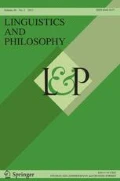Abstract
In this paper I offer an account of the meaning of ‘must’ and ‘can’ within the framework of possible worlds semantics. The paper consists of two parts: the first argues for a relative concept of modality underlying modal words like ‘must’ and ‘can’ in natural language. I give preliminary definitions of the meaning of these words which are formulated in terms of logical consequence and compatibility, respectively. The second part discusses one kind of insufficiency in the meaning definitions given in the first part, which arise from the ‘ex falso quodlibet’ paradox of logical consequence. In stepwise fashion, I make an attempt to avoid most of the consequences of this paradox for the meaning definitions of ‘must’ and ‘can’.
Similar content being viewed by others
References
Cresswell, M. J.: 1973, Logics and Languages. London: Methuen.
Grabski, M.: 1974, Syntax und Semantik der Modalverben in Aussagesätzen des Deutschen. Dissertation, Universität Stuttgart.
Kratzer, A.: 1976, ‘Was “können” und “müssen” bedeuten können müssen’. Linguistische Berichte 42.
Lewis, D. K.: 1973, Counterfactuals. Oxford: Basil Blackwell.
Rescher, N.: 1973, The Coherence Theory of Truth. Oxford: Clarendon Press.
Author information
Authors and Affiliations
Additional information
I am grateful for discussions with John Bigelow, Max Cresswell, Urs Egli and Arnim von Stechow. John Bigelow and Max Cresswell also read a draft of this paper and made many helpful comments and corrections. The German predecessor of this paper (Kratzer 1976) contains a mistake which was pointed out to me by David Lewis.
Rights and permissions
About this article
Cite this article
Kratzer, A. What ‘must’ and ‘can’ must and can mean. Linguistics and Philosophy 1, 337–355 (1977). https://doi.org/10.1007/BF00353453
Published:
Issue Date:
DOI: https://doi.org/10.1007/BF00353453



